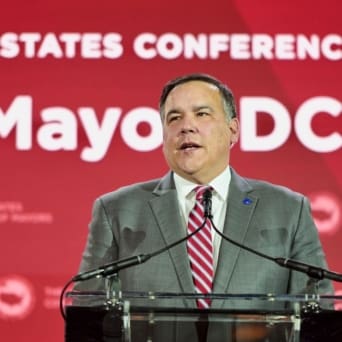Seven Cities Rise to the Top by Earning Overall Gold Medals
WASHINGTON, D.C.—December 5, 2023—Today, CityHealth, an initiative of the de Beaumont Foundation and Kaiser Permanente, released its 2023 annual policy assessment of the largest 75 cities in the United States, finding significant progress made by cities advancing health-promoting, prevention-oriented policies that support community health. This year, 46 cities (61%) were awarded overall medals, up from 37 cities (49%) in 2022. More than 43 million people live in a city that has earned an overall medal — an increase of more than 4 million people compared to last year. The findings suggest that local leaders continue to prioritize health as they seek solutions to a diverse set of challenges — from a lack of affordable housing to mitigating the effects of climate change and extreme weather.
“We are thrilled to see more than half of the largest cities across the country increasingly adopting health-oriented policies aimed at addressing pressing challenges that are faced by communities,” said CityHealth Co-Executive Director Katrina Forrest, JD. “Our local leaders are operating at the intersection of complex and convergent issues; everything from homelessness and housing affordability to food insecurity. This growth is encouraging as it clearly shows that local leaders are seeing the critical role they play in promoting health equity through policy.”
This year, seven cities — Boston, Denver, Minneapolis, New Orleans, Portland, San Antonio and St. Louis — have succeeded in earning overall gold medals. These cities qualified for overall gold by earning at least five gold medals across 12 individual policy areas: Boston, Minneapolis and Portland earned six gold medals; and Denver, New Orleans, San Antonio and St. Louis earned five gold medals. (See the full overall medal list below.)
“Working alongside city leaders and partners, our goal is to empower local stakeholders to transform health outcomes across the country,” said CityHealth Co-Executive Director Catherine Patterson, MPP. “The CityHealth model serves as a framework to equip leaders, policymakers and residents with tools to drive meaningful health improvements in their cities to help them lead healthier lives today and in the future.”
Cities can earn individual gold, silver, or bronze medals in CityHealth’s 12 policy areas, with overall medals awarded to cities earning 5 or more individual policy medals. The medals are awarded for city laws that meet CityHealth’s policy criteria, which provide an evidence-backed framework that cities can use to help promote health equity and address key public health concerns such as affordable housing, earned sick leave, access to greenspace, and more.
“Vibrant, healthy communities are a result of effective policies and programs,” said Brian C. Castrucci, DrPH, MA, president and CEO of the de Beaumont Foundation. “The CityHealth assessment serves as a valuable benchmark for evaluating cities’ efforts in improving community health. We are pleased to see the progress made from the last assessment, and we are hopeful for more progress to be accomplished in more cities across the country.”
Two policy areas that saw significant movement in 2023 were Affordable Housing Trusts and Greenspace. With the end of most pandemic-era funding that supported local health-promoting initiatives, cities are increasingly adopting laws that address the housing crisis and access to public outdoor space. Over half (59%) of cities earned a medal for their Affordable Housing Trusts policies to help ensure sustained funding for affordable housing projects. Similarly, 69% of cities earned medals for their Greenspace policies, with many prioritizing investments in parks that are driven by principals of equity.
“Cities are uniquely positioned to create community conditions that promote health and wellbeing,” said Bechara Choucair, MD, senior vice president and chief health officer at Kaiser Permanente. “The CityHealth initiative is proud to support localities in adopting evidence-based health policies that give everyone the opportunity to thrive.”
2023 ANNUAL REPORT KEY FINDINGS
CityHealth, in partnership with the Center for Public Health Law Research at Temple University’s Beasley School of Law and other evaluation partners, rated America’s 75 largest cities based on the criteria established for each of the 12 policy solutions (listed below) using gold, silver and bronze medals. For complete results, including individual medals by policy area, go to: https://www.cityhealth.org/2023-assessment/.
OVERALL RESULTS*
Gold
- Boston
- Denver
- Minneapolis
- New Orleans
- Portland
- San Antonio
- St. Louis
Silver
- Atlanta
- Chicago
- Kansas City
- Los Angeles
- Milwaukee
- New York
- Newark
- Philadelphia
- Pittsburgh
- San Francisco
- San Jose
- Seattle
- St. Paul
- Washington, DC
Bronze
- Albuquerque
- Anaheim
- Aurora
- Baltimore
- Cleveland
- Colorado Springs
- Columbus
- Dallas
- Detroit
- Fort Worth
- Fresno
- Henderson
- Houston
- Indianapolis
- Lincoln
- Long Beach
- Louisville
- Nashville
- Oakland
- Riverside
- Sacramento
- San Diego
- Santa Ana
- Stockton
- Tucson
POLICY AREAS
CityHealth’s tried and tested policies help all people in our nation’s largest cities have access to have a safe place to live, a healthy body and mind, and a thriving environment. Learn more:
- Affordable Housing Trusts
- Complete Streets
- Earned Sick Leave
- Eco-Friendly Purchasing
- Flavored Tobacco Restrictions
- Greenspace
- Healthy Food Purchasing
- Healthy Rental Housing
- High-Quality, Accessible Pre-K
- Legal Support for Renters
- Safer Alcohol Sales
- Smoke-Free Indoor Air
###
CityHealth, an initiative of the de Beaumont Foundation and Kaiser Permanente, works to advance a package of proven policy solutions that will help millions of people live longer, better lives in vibrant, prosperous communities. CityHealth regularly evaluates cities on the number and strength of their policies. Find out more at cityhealth.org.
The de Beaumont Foundation advances policy, builds partnerships, and strengthens public health to create communities where people can achieve their best possible health. Learn more at www.debeaumont.org.
Kaiser Permanente is committed to helping shape the future of health care. We are recognized as one of America’s leading health care providers and not-for-profit health plans. Founded in 1945, Kaiser Permanente has a mission to provide high-quality, affordable health care services and to improve the health of our members and the communities we serve. We currently serve 12.6 million members in eight states and the District of Columbia. Care for members and patients is focused on their total health and guided by their personal Permanente Medical Group physicians, specialists and team of caregivers. Our expert and caring medical teams are empowered and supported by industry-leading technology advances and tools for health promotion, disease prevention, state-of-the-art care delivery and world-class chronic disease management. Kaiser Permanente is dedicated to care innovations, clinical research, health education and the support of community health. For more information, go to: kp.org.





